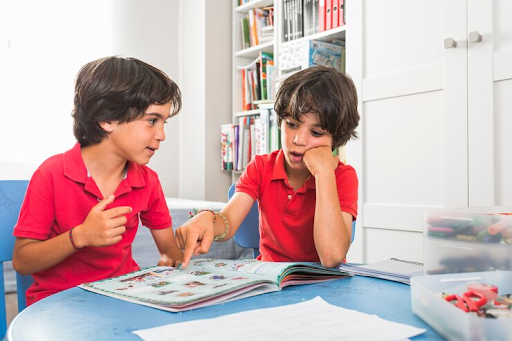Trilingual preschools offer a unique and enriching environment for young children to develop their cognitive and linguistic skills.
By immersing children in three different languages from a young age, these schools stimulate brain development and enhance problem-solving abilities.
Research has shown that children who are exposed to multiple languages early on tend to have better communication skills, improved memory, and enhanced creativity.
In this article, we will explore the benefits of trilingual preschools and how they can positively impact children’s overall development, setting a strong foundation for future academic success.
Early Exposure to Multiple Languages
Research has shown that children enrolled in trilingual programs demonstrate greater cognitive flexibility, problem-solving skills, and language proficiency compared to their monolingual peers.
By immersing children in a multilingual environment from a young age, trilingual preschools help foster a deeper understanding and appreciation of different cultures and languages, setting a strong foundation for lifelong language learning and cognitive development.
Enhanced Cognitive Flexibility
Research suggests that multilingual individuals have enhanced cognitive flexibility, allowing them to switch between languages and tasks more efficiently.
Trilingual preschoolers develop this flexibility early on, which can benefit various aspects of their cognitive development, including problem-solving and creativity.
Improved Executive Functioning
Trilingual preschools undoubtedly contribute to improved executive functioning in children by providing them with the opportunity to navigate and process multiple language systems simultaneously.
The constant switching between languages demands a higher level of cognitive control, leading to strengthen skills in attention, working memory, and inhibitory control.
- Attention: Children must focus on the language being spoken and filter out irrelevant information from other languages.
- Working memory: Juggling multiple languages requires children to hold information in their minds while actively using it to communicate.
- Inhibitory control: They learn to suppress one language while using another, honing their ability to inhibit automatic responses and regulate their linguistic output.
Heightened Language Awareness
By exposing young learners to three different languages from an early age, these programs help them become more attuned to the nuances of language structure, syntax, and vocabulary.
This heightened awareness not only improves their communication skills in multiple languages but also enhances their cognitive abilities, such as problem-solving and critical thinking.
Overall, trilingual preschools provide a rich linguistic environment that nurtures children’s overall development.
Cultural Appreciation and Diversity
By exposing young learners to multiple languages and cultures from an early age, these schools foster an environment of inclusion and understanding.
This exposure not only enriches children’s cognitive and linguistic development but also helps them develop a deeper sense of empathy and respect for others.
Embracing cultural diversity in the classroom encourages children to celebrate differences and promotes a more inclusive and harmonious society as they grow and learn.
Increased Vocabulary and Language Skills
Trilingual preschools have shown to significantly enhance children’s cognitive and linguistic development by increasing their vocabulary and language skills.
Exposure to three different languages from an early age not only expands a child’s linguistic repertoire, but also strengthens their cognitive abilities such as problem-solving, critical thinking, and multitasking.
This immersive environment fosters a deeper understanding of diverse cultures and perspectives, equipping children with valuable communication skills and a heightened ability to adapt to new and challenging situations in the future.
Enhanced Social Skills
Through exposure to multiple languages and cultures, children learn to communicate effectively with a wider range of people, developing empathy, tolerance, and respect for others.
- Exposure: Multilingual exposure fosters effective communication across diverse cultural backgrounds.
- Develop Empathy: Children develop empathy, tolerance, and respect through interactions with various languages and cultures.
- Future Interactions: Enhanced social skills acquired through multicultural experiences benefit current and future interactions.
- Cognitive Growth: Multilingualism establishes a robust foundation for cognitive and linguistic growth.
Greater Brain Plasticity
Trilingual preschools have been found to enhance children’s cognitive and linguistic development by fostering greater brain plasticity.
The exposure to multiple languages at a young age helps to strengthen neural connections and increase flexibility in the brain, allowing children to more easily adapt to new information and tasks.
This enhanced brain plasticity not only improves language skills but also benefits cognitive functions such as problem-solving, memory, and multitasking.
Academic Advantages
Research shows that exposure to multiple languages at a young age can improve problem-solving skills, memory retention, and overall cognitive flexibility.
Additionally, learning multiple languages from an early age can help children become more adept at adapting to new learning environments and challenges.
This enriched cognitive development can lead to improved academic performance in various subjects throughout their educational journey.
Long-Term Benefits
Trilingual preschools offer long-term benefits by providing children with the opportunity to become fluent in three languages, enhancing their cognitive and linguistic development.
Research shows that being exposed to multiple languages at a young age can improve problem-solving abilities, boost memory retention, and foster a more flexible and adaptable mindset.
This early exposure to diverse language environments sets a strong foundation for lifelong learning and communication skills, enabling children to navigate a globalized world with confidence and ease.
Conclusion
Trilingual preschools offer a unique and enriching educational experience that positively impacts children’s cognitive and linguistic development.
By fostering multilingualism from an early age, these schools prepare children for success in an increasingly interconnected and diverse world.
Investing in trilingual education not only benefits individual children but also contributes to a more inclusive and culturally rich society.




